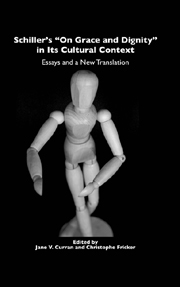Book contents
- Frontmatter
- Contents
- Acknowledgments
- Notes on References and List of Abbreviations
- Introduction
- The Cultural Context
- Schiller's Essay “Über Anmut und Würde” as Rhetorical Philosophy
- Schiller as Citizen of His Time
- Sensuous-Objective: Beauty in the Realm of Human Freedom: On the Language of Concepts in Schiller's Essay “On Grace and Dignity”
- From Romantic Dream to Idyllic Tragedy: Idealism and Realism in Schiller's Dramas, Before and After Kant
- The Poet as Herald of Grace and Dignity: The Influence of Schiller's Twin Concepts on Stefan George
- The Text
- Notes on the Contributors
- Index
Sensuous-Objective: Beauty in the Realm of Human Freedom: On the Language of Concepts in Schiller's Essay “On Grace and Dignity”
from The Cultural Context
Published online by Cambridge University Press: 05 February 2013
- Frontmatter
- Contents
- Acknowledgments
- Notes on References and List of Abbreviations
- Introduction
- The Cultural Context
- Schiller's Essay “Über Anmut und Würde” as Rhetorical Philosophy
- Schiller as Citizen of His Time
- Sensuous-Objective: Beauty in the Realm of Human Freedom: On the Language of Concepts in Schiller's Essay “On Grace and Dignity”
- From Romantic Dream to Idyllic Tragedy: Idealism and Realism in Schiller's Dramas, Before and After Kant
- The Poet as Herald of Grace and Dignity: The Influence of Schiller's Twin Concepts on Stefan George
- The Text
- Notes on the Contributors
- Index
Summary
Schiller's thought confronts us with the proposition that humans only ever reach the unity of human Being* within the realm of the laws of beauty. The task of cultivating beauty results from this. This is as true for art and the artist as it is for man's relationship with himself. Schiller calls this task “Aesthetische Erziehung” (Aesthetic Education), and his essay “On Grace and Dignity” deals with it too. Professor of Universal History at Jena and citizen of his time (NA 20:311), Schiller was concerned about the unfolding of the French Revolution and threw out a broad challenge with his “Aufgabe für mehr als Ein Jahrhundert” (NA 20:329; task for more than one century) for modern man who, despite having enlightened concepts for everything, has not learned how to understand the realm of his freedom and still needs to grasp that “es die Schönheit ist, durch welche man zu der Freyheit wandert” (NA 20:312; it is through beauty that one arrives at freedom). Schiller knows that the formulation of such a plan stretches back as far as those beginnings of thought in the West that gave the first impulse to the formation of our ideas. Ever since Plato, however, the concepts of grace and dignity, aimed at determining the nature of art and beauty, have been as contentious as the methods of inquiry about the essence of man. Schiller takes up the challenge, conscious of the fact that it is the operations of reflection themselves that make the matter so contentious, because they fall short of revealing the unity of the human in the realm of beauty and art.
- Type
- Chapter
- Information
- Schiller's 'On Grace and Dignity' in its Cultural ContextEssays and a New Translation, pp. 55 - 80Publisher: Boydell & BrewerPrint publication year: 2005

